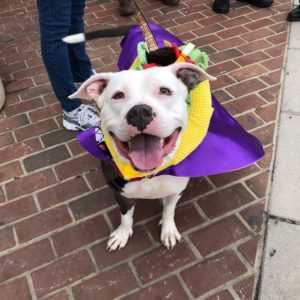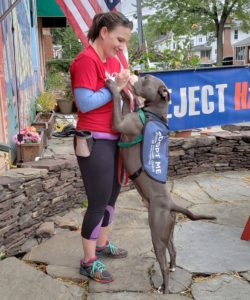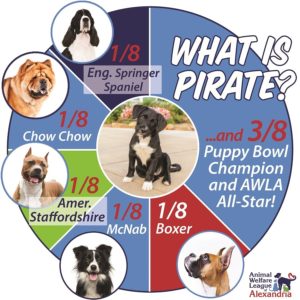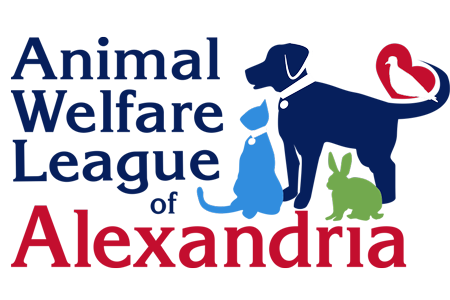 October is Pit Bull Awareness Month, as if we needed another reason to talk about the many wonderful pups who come through our doors at the Animal Welfare League of Alexandria! Whether you love them for their smiling faces or their resemblance to happy hippopotamuses, talking about “Pit Bull” dogs can be tricky since ”Pit Bull” is not actually a breed. Breeds including the Staffordshire Bull Terrier, American Pit Bull Terrier, American Bulldog and Bull Terrier (among others) might be considered to be “Pit Bulls” but in fact, since it is not a distinct breed, people are often making this classification based on looks rather than actual genetics.
October is Pit Bull Awareness Month, as if we needed another reason to talk about the many wonderful pups who come through our doors at the Animal Welfare League of Alexandria! Whether you love them for their smiling faces or their resemblance to happy hippopotamuses, talking about “Pit Bull” dogs can be tricky since ”Pit Bull” is not actually a breed. Breeds including the Staffordshire Bull Terrier, American Pit Bull Terrier, American Bulldog and Bull Terrier (among others) might be considered to be “Pit Bulls” but in fact, since it is not a distinct breed, people are often making this classification based on looks rather than actual genetics.
Like other dogs who were initially bred for different types of work, so-called “bully breeds,” which include Bulldogs and Mastiffs, were initially bred to hold bulls, bears and other large animals for hunting or sport. Larger Mastiffs were bred with more agile terriers to make them smaller and quicker. But like shepherds, retrievers and other types of dogs, most of our best friends’ work today involves puzzle toys and walks around the block rather than herding livestock or retrieving hunted game.
 So when a dog comes to the AWLA, we assess each pup’s personality and behaviors to see what they might be looking for in their future family rather than looking at their appearance to make assumptions about their personality. Does a dog enjoy spending most of their day on the move and therefore will need a lot of exercise in their future home? Are they very smart and get bored easily, meaning they might enjoy extra mental stimulation? Does this pup need a little extra time to grow comfortable around new people? By learning about dogs on an individual basis, we are able to set them up for success with their new families.
So when a dog comes to the AWLA, we assess each pup’s personality and behaviors to see what they might be looking for in their future family rather than looking at their appearance to make assumptions about their personality. Does a dog enjoy spending most of their day on the move and therefore will need a lot of exercise in their future home? Are they very smart and get bored easily, meaning they might enjoy extra mental stimulation? Does this pup need a little extra time to grow comfortable around new people? By learning about dogs on an individual basis, we are able to set them up for success with their new families.
DNA tests for people and their animal best friends are at a height of popularity right now, but at the AWLA, waiting weeks for a DNA test for each pup would slow down their process of finding a family, and since dogs have unique personalities regardless of their breed, this isn’t necessary for them to be adopted. And the cost of DNA testing is better used at the AWLA to provide food, shelter and medical care. Visually assessing a dog’s breed helps adopters who live in homes or jurisdictions that might have breed restrictions, but since only a small percentage of a dog’s genes are expressed in their physical appearance, most of their breed mix cannot be determined visually.
 As an example, Pirate, now an adult, was adopted from the AWLA as a puppy in October of 2018. While he was with us, he participated in the Puppy Bowl where he was offered a DNA test. A distinctive pup, we guessed he might be a Miniature Schnauzer, but his test came back with surprising results!
As an example, Pirate, now an adult, was adopted from the AWLA as a puppy in October of 2018. While he was with us, he participated in the Puppy Bowl where he was offered a DNA test. A distinctive pup, we guessed he might be a Miniature Schnauzer, but his test came back with surprising results!
Pirate’s DNA test came back with ⅛ Boxer, ⅛ McNab, ⅛ Staffordshire Terrier, ⅛ Chow Chow, ⅛ Springer Spaniel and ⅜ a little mix of everything else. And when a dog is a mixture of breeds, like Pirate, we cannot expect that any characteristics of those parental breeds would necessarily be passed down to their children; each genetic mix creates a different personality and set of traits, which are further affected by how those animals are raised and trained.
Since each dog is an individual, dog lovers and owners outside of the AWLA should keep this in mind. Every dog you meet while walking around your neighborhood reacts differently to new people and situations, so look for signs that they are comfortable meeting you — and of course, look to that animal’s owner for permission or guidance — before giving Fido a scratch behind the years. If you know your dog appreciates a slow introduction to new friends, don’t hesitate to say that your pup prefers to meet new people or other dogs from a distance.
Every pup reacts differently to new situations, and their comfort level can change over time. For that reason, the AWLA offers a behavior hotline available to pet owners, regardless of whether they adopted from the AWLA or not. You can contact our hotline at behavior@alexandriaanimals.org or 703-746-5654.
So this Pit Bull Awareness Month and every day at the AWLA, we celebrate the many types of dogs who come through our doors and those throughout our community. No matter their looks or genetics, each dog has their own unique personality, and that’s why we love them.
Get the latest animal news right to your inbox!



